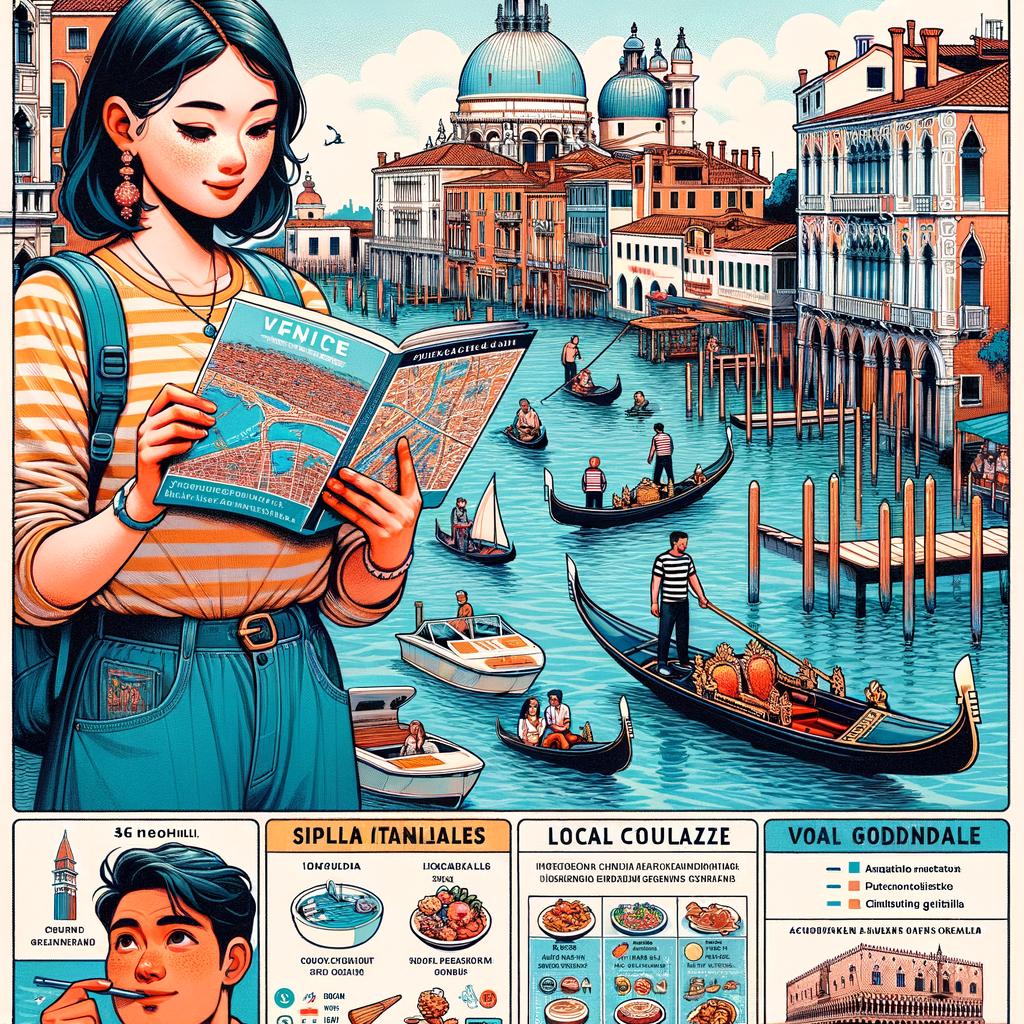Venice, Italy is a captivating city known for its intricate network of canals, stunning architecture, and romantic ambiance. When planning a visit to this unique destination, there are several key factors to consider in order to make the most of your experience. From transportation options to accommodation choices, understanding the Venice transportation system, must-see attractions, dining venues, shopping opportunities, cultural customs, and safety tips – being prepared will ensure a smooth and enjoyable trip.
As you prepare for your journey to Venice Italy, it is essential to familiarize yourself with the various transportation options available to reach this enchanting city. Whether arriving by plane, train, or car – knowing how to navigate the arrival process will set the tone for your entire stay.
Once in Venice, selecting the best accommodation option will depend on your preferences and budget. From luxurious canal-side hotels to charming bed-and-breakfasts tucked away in quiet alleyways, there is something for every traveler.
Navigating through the maze-like streets and waterways of Venice may seem like a challenge at first glance but understanding the city’s unique transportation system is key. With vaporettos (waterbuses) serving as one of the main modes of getting around, familiarizing yourself with routes and schedules will ensure efficient travel from one iconic attraction to another.
As you embark on your journey through Venice’s hidden gems and well-known sights alike, immersing yourself in local customs and etiquette will enhance your experience and deepen your appreciation for this historic city.
Getting There
When planning your trip to Venice, Italy, it is essential to consider your transportation options to reach this unique city of canals and romance. Here are some ways to get to Venice:
- By Air: The most common way to travel to Venice is by flying into Marco Polo Airport, located on the mainland, just a short distance from the city. From the airport, you can easily reach Venice by water taxi or bus.
- By Train: Venice is well-connected to Italy’s extensive rail network, making it easy to reach the city by train from major cities such as Rome, Florence, and Milan. The Santa Lucia train station is located in Venice itself, allowing for a convenient arrival right in the heart of the city.
- By Car: While cars are not allowed within the historic center of Venice, you can still drive close to the city and park in Piazzale Roma or Tronchetto before continuing your journey on foot or by water transport. Keep in mind that navigating the narrow streets and bridges of Venice can be challenging for drivers unfamiliar with the area.
Whether you choose to arrive by air, train, or car, each transportation option offers its own unique experience of entering this enchanting city. Consider your preferences for convenience, budget, and overall travel experience when deciding on the best way to reach Venice.
Remember these important tips for an enjoyable journey: book tickets in advance whenever possible, be prepared for potential delays or changes in schedules due to weather or other factors, and familiarize yourself with local transportation options upon arrival. By planning ahead and understanding your transportation choices when travelling to Venice Italy, you can ensure a smooth and stress-free arrival in one of Italy’s most iconic destinations.
Where to Stay
When planning a trip to Venice, one of the most crucial decisions you’ll have to make is choosing where to stay. The city offers a wide range of accommodation options, from luxury hotels with stunning views of the Grand Canal to cozy bed and breakfasts tucked away in quiet alleyways. Here are some of the best places to consider when deciding where to stay in Venice:
- Grand Canal Hotels: For those looking for a luxurious experience, staying in a hotel along the Grand Canal is a must. These hotels offer breathtaking views of the waterway and easy access to many of Venice’s top attractions.
- Historic Palazzos: Venice is known for its beautiful historic buildings, and many have been converted into unique boutique hotels. Staying in a restored palazzo allows you to experience the city’s history up close while enjoying modern amenities.
- Quiet Neighborhoods: If you prefer a more peaceful retreat away from the hustle and bustle of tourists, consider staying in one of Venice’s quieter neighborhoods like Dorsoduro or Cannaregio. These areas offer a more authentic Venetian experience and are still within walking distance of major sights.
No matter where you choose to stay in Venice, be sure to book your accommodations well in advance, especially during peak tourist seasons. Many popular hotels fill up quickly, so it’s essential to secure your reservation early.
Additionally, keep in mind that Venice is made up of islands connected by bridges, so be prepared for some walking with your luggage upon arrival. By selecting the right accommodation option for your preferences and budget, you can make your trip to Venice even more memorable and enjoyable.
Remembering what location matches your needs best can enhance your experience while visiting this enchanting city filled with history, art, architecture and culture.
Navigating the City
Venice, known as the “City of Canals,” is a unique destination that offers travelers a glimpse into its rich history and romantic charm. When visiting this iconic city in Italy, one of the first things to familiarize yourself with is the Venice transportation system.
Unlike other cities where cars dominate the streets, Venice relies heavily on waterways for transportation. The primary mode of getting around in Venice is by boats known as vaporettos, which are essentially water buses that operate on different routes along the canals.
When you travel to Venice, Italy, it’s essential to understand how vaporettos work so you can navigate the city efficiently. Vaporettos are a convenient and picturesque way to travel from one part of Venice to another. These boats run at regular intervals and provide stops at various key locations throughout the city. It’s important to study the vaporetto routes and schedules beforehand so you can plan your travels accordingly and avoid any confusion while exploring Venice.
Another crucial aspect to consider when using the Venice transportation system is purchasing tickets for the vaporettos. You can buy single journey tickets or opt for multi-day passes depending on your length of stay in Venice. Keep in mind that ticket prices may vary based on factors such as duration and zones covered. Additionally, familiarize yourself with validating your ticket before boarding a vaporetto to avoid fines or penalties during your travels in Venice.
| Travel Tip | Important Information |
|---|---|
| Transportation Mode | Vaporettos (water buses) |
| Ticket Options | Single journey, multi-day passes |
| Validation | Remember to validate your ticket before boarding |
By understanding how the Venice transportation system works and being prepared with the necessary information and tickets, you can make the most out of your visit to this enchanting city. Navigating through its intricate network of canals and experiencing its unique mode of transport will undoubtedly add a memorable touch to your travel experience in Venice.
Whether you’re exploring historic landmarks or venturing off the beaten path, mastering the art of getting around in Venice will enhance your overall trip and allow you to soak in all that this beautiful city has to offer.
Must-See Attractions
Venice, Italy, is a city that offers a plethora of must-see attractions for any traveler. One of the most iconic landmarks in Venice is St. Mark’s Basilica, located in St. Mark’s Square. This stunning cathedral showcases a mix of Byzantine, Gothic, and Renaissance architectural styles, making it a true masterpiece. Visitors can marvel at the intricate mosaics adorning the interior or climb to the top of the basilica’s bell tower for panoramic views of the city.
Another essential stop on any Venice itinerary is the Rialto Bridge, which spans the Grand Canal and connects the San Marco and San Polo districts. Dating back to the late 16th century, this picturesque bridge is lined with shops and stalls where you can purchase souvenirs or simply admire the views of gondolas gliding along the canal below.
The Rialto Bridge exudes charm and history, making it a perfect spot for taking photographs or immersing yourself in the essence of Venice.
In addition to these two famous attractions, there are countless other sights to explore in Venice, such as Doge’s Palace, Bridge of Sighs, Peggy Guggenheim Collection Museum, and numerous art galleries showcasing works by Venetian masters. As you navigate through the cobblestone streets and narrow alleys of Venice, you will encounter hidden gems waiting to be discovered around every corner.
Whether you are interested in history, art, or simply soaking up the romantic atmosphere of this unique city, Venice has something for everyone.
| Attractions | Description |
|---|---|
| St. Mark’s Basilica | Showcases a mix of Byzantine, Gothic, and Renaissance architectural styles |
| Rialto Bridge | Picturesque bridge spanning the Grand Canal with shops and stunning views |
Dining in Venice
When visiting Venice, Italy, one of the highlights of your trip is undoubtedly exploring the traditional Venetian cuisine that the city has to offer. From fresh seafood dishes to delectable pastas and savory cicchetti (small snacks), Venice is a culinary paradise for food lovers. To truly savor the flavors of this unique city, it’s important to know where to find the best eateries and what dishes to try.
Must-Try Venetian Dishes
Venice is known for its seafood specialties, so be sure to try classic dishes like risotto al nero di seppia (risotto with cuttlefish ink), sarde in saor (sweet and sour sardines), and fritto misto di pesce (mixed fried seafood). For pasta lovers, don’t miss out on bigoli in salsa (thick spaghetti in a savory anchovy sauce) or the iconic spaghetti alle vongole (spaghetti with clams).
And for a sweet treat, indulge in tiramisu, which is said to have originated in Venice.
Where to Eat in Venice
While it’s easy to stumble upon tourist traps in Venice, there are also plenty of authentic and delicious dining options throughout the city. Head to bacari (wine bars) for cicchetti paired with a glass of local wine, or dine at a traditional trattoria for a hearty meal. Some popular areas for dining include San Polo, Cannaregio, and Dorsoduro. Be sure to make reservations in advance as restaurants can get crowded, especially during peak tourist seasons.
Cultural Dining Etiquette
In Venice, dining is more than just about eating – it’s an experience that often involves socializing and taking your time to enjoy each course. When dining out in Venice, remember that service charges are usually included in the bill, but it’s customary to leave a small tip if you’re pleased with the service.
Additionally, dress codes may vary depending on the establishment, so it’s always a good idea to check before heading out for a meal. By immersing yourself in the local culinary customs and etiquette, you’ll truly enhance your dining experience in Venice.
Shopping in Venice
When traveling to Venice, Italy, exploring the city’s unique shopping scene is a must-do activity. From traditional Murano glass to delicate lace products, there are plenty of souvenirs and local products to choose from.
One of the best places to shop for authentic Venetian goods is at the Rialto Market, where you can find fresh produce, local delicacies, and handmade crafts. Additionally, shopping along the streets of Venice will lead you to boutique stores selling everything from high-end fashion to artisanal goods.
In Venice, it’s essential to be aware of the reputation surrounding mass-produced souvenirs that are often sold in popular tourist areas. To ensure you’re purchasing quality products that support local artisans, consider visiting shops recommended by locals or seeking out small boutiques off the beaten path. This not only guarantees a more authentic shopping experience but also helps preserve traditional craftsmanship in Venice.
Before making any purchases, it’s important to have an understanding of bargaining customs in Venice. While haggling over prices is not common practice in most stores, it may be acceptable in certain markets or with independent vendors.
However, always approach negotiations with respect and courtesy, keeping in mind that the goal is not just to secure a good deal but also to appreciate the skill and effort that goes into creating each item. By following these tips on shopping in Venice and being mindful of supporting local businesses, you can bring home meaningful mementos from your trip while contributing to the rich cultural heritage of this enchanting city.
Cultural Tips
When traveling to Venice, Italy, it’s important to familiarize yourself with the customs and etiquette of the Venetian culture. By understanding and respecting these cultural norms, you can ensure a more enjoyable and memorable experience in this unique city.
Greetings and Interactions
Venetians are known for their warmth and friendliness, so don’t be surprised if locals greet you with a friendly “Ciao.” when you pass by. When meeting someone for the first time, it is customary to shake hands. If you are invited into someone’s home, be sure to bring a small gift or flowers as a token of appreciation.
Dress Code
Venice is a city with deep historical roots and a strong sense of tradition. When visiting churches, museums, or upscale restaurants, it is important to dress modestly and respectfully. Avoid wearing beach attire or clothing that is too revealing. It’s also worth noting that heels may not be practical due to the uneven cobblestone streets.
Dining Etiquette
When dining in Venice, be prepared for a leisurely meal filled with conversation and good company. Tipping is not as common in Italy as it is in other countries, as service charges are often included in the bill.
However, if you receive exceptional service, it is appreciated to leave a small tip as a gesture of gratitude. Additionally, remember that it is considered rude to ask for separate checks at restaurants in Italy; instead, one person typically pays the bill for the entire table.
Safety Tips
When traveling to Venice, Italy, it is important to consider some safety tips to ensure a smooth and enjoyable experience in this unique city of canals. One key aspect to keep in mind is the issue of pickpocketing, which can be common in crowded areas such as popular tourist spots and public transportation.
To avoid falling victim to pickpockets, it is advisable to keep your belongings secure and be aware of your surroundings at all times. Consider using anti-theft backpacks or money belts to store important documents like passports and credit cards.
Additionally, while exploring Venice’s charming streets and alleys, it is essential to watch out for uneven surfaces and slippery cobblestones that may pose a tripping hazard. Comfortable walking shoes with good grip are recommended for navigating the city’s narrow pathways. Be cautious when crossing bridges over the canals, especially during rainy or foggy weather when surfaces may become slick.
Furthermore, when taking water taxis or vaporettos (water buses) along the Grand Canal or other waterways in Venice, make sure to follow safety regulations by wearing life jackets if provided. It is also wise to be mindful of your personal space and not overcrowd these modes of transportation. By staying alert and informed about potential safety risks, you can better enjoy your time exploring the enchanting city of Venice while minimizing any safety concerns that may arise.
Conclusion
In conclusion, visiting Venice, Italy is a truly magical experience that offers a unique blend of history, culture, and beauty. By understanding what to know when you travel to Venice Italy, you can make the most of your trip and truly immerse yourself in all that this enchanting city has to offer.
From the moment you arrive in Venice, be prepared to be whisked away by the charm of its winding canals and historic architecture. Make sure to take advantage of the various transportation options available, from water taxis to gondolas, to navigate this city built on islands. Choosing the right accommodation is also crucial for a comfortable stay, with options ranging from luxurious hotels with canal views to quaint bed and breakfasts tucked away in quiet alleyways.
While exploring Venice’s must-see attractions like St. Mark’s Basilica and the Rialto Bridge is a must, don’t forget to indulge in traditional Venetian cuisine at local restaurants and explore the city’s vibrant shopping scene for unique souvenirs. Remember to always respect Venetian customs and etiquette to fully appreciate the local culture.
And above all else, prioritize your safety by staying alert while navigating Venice’s bustling streets and crowded tourist spots. With these tips in mind, your trip to Venice Italy is sure to be a memorable adventure that will leave you longing for more of this captivating city on water.
Frequently Asked Questions
What You Need to Know About Visiting Venice?
Venice is a unique city known for its beautiful canals, historic architecture, and rich cultural heritage. Visitors should be prepared for the crowded streets, especially during peak tourist seasons.
It’s important to plan ahead and book accommodations and tours in advance to avoid any last-minute hassles. Exploring Venice on foot or by water taxi is the best way to soak in the charm of this iconic city.
What Are the New Rules for Venice Visitors?
Venice has implemented new rules and regulations to manage the impact of overtourism on the city. These include restrictions on large cruise ships entering the lagoon, fines for sitting in undesignated areas like St. Mark’s Square, and penalties for littering or swimming in the canals.
It’s crucial for visitors to respect these rules to help preserve the fragile ecosystem and cultural heritage of Venice for future generations.
Do People Speak English in Venice?
English is widely spoken in Venice, especially in tourist areas like hotels, restaurants, and shops. However, it’s always appreciated when visitors make an effort to learn a few basic Italian phrases as a sign of respect for the local culture.
Engaging with locals in their native language can enhance your overall experience and make your interactions more meaningful during your stay in Venice.

I’m a passionate traveler, writer, and Italophile. My fascination with Italy’s history, art, and culture has led me on countless adventures across the Italian landscape. Through “I Live Italy,” I share my love for this extraordinary country and aims to inspire others to explore its boundless beauty.





